"The Blonde with Black Eyes -REVIEW|"La rubia de ojos negros" -RESEÑA (ENG-ESP)
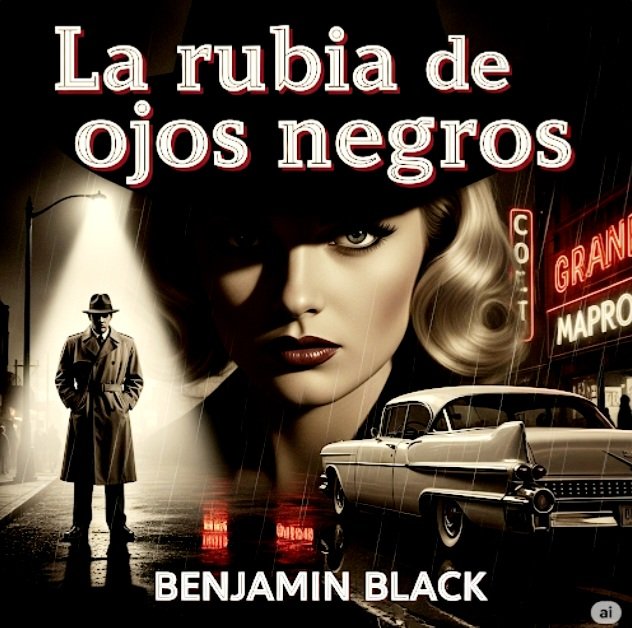
And then there's Benjamin Black (or John Banville, which is the same thing), who has insisted on showing that sometimes, even if you want to, you can't. His sin: daring to revive Philip Marlowe in a novel he titled "The Blonde with Black Eyes."
It's an act of bad taste, a literary desecration through and through.
It's not that the intention isn't appreciated, but the result is an insult to the memory of Raymond Chandler. Black dons the maestro's hat, puts on his trench coat, and, in a clumsy attempt to imitate his walk, ends up looking like a drunken clown who's lost his way. He gives us not a detective, but a caricatured ghost wandering through an implausible Los Angeles. A cardinal sin in fiction.
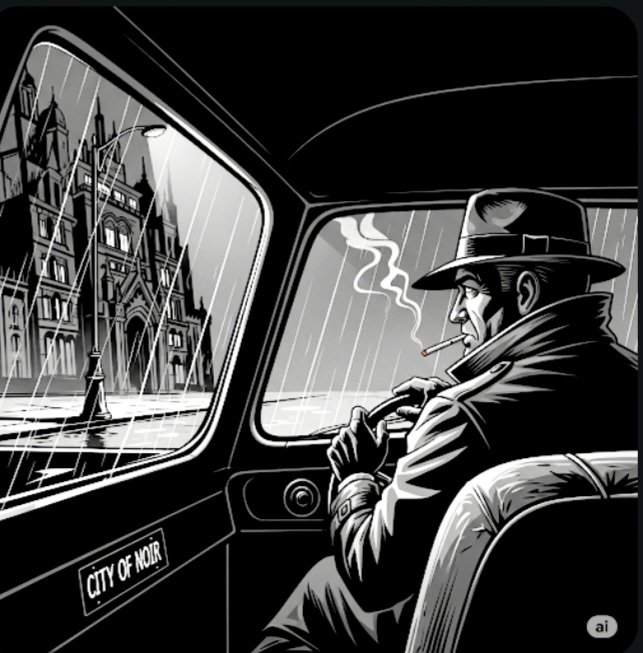
The Cardboard Detective
The Philip Marlowe Black presents is the AliExpress version of the original. He still utters the same cynical phrases and drinks whiskey as if the world were ending, but he does so without the soul, without the elegance of despair.
Chandler's Marlowe was a world-beaten idealist, a knight-errant in the underworld, a man who, despite his scars, maintained an unwavering moral code. Black's is merely a curmudgeon, a punching bag with a grimy office. His blows and misery don't move; they bore.
He seems to enjoy physical punishment, getting into pointless fights with a regularity that would make any detective with a modicum of intelligence blush.
This Marlowe, rather than being a master of deduction, is a lucky idiot (or, rather, a lucky idiot). He wanders around, groping in the dark, is fooled with astonishing ease, and seems incapable of following a trail without being beaten first. They try to sell him as the same guy from Chandler's novels, but he's a puppet. A wasted scarecrow in a cornfield.
When he speaks, he sounds like a ventriloquist moving his jaw. He lacks the spark, the inner fire that made him great. This is a watered-down, monotonous, and, frankly, irritating version of an icon.
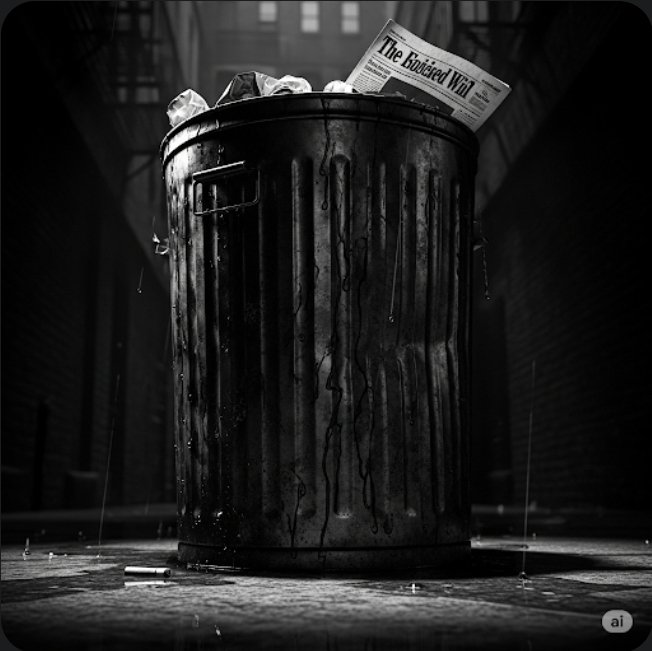
The Blonde, the Great Swindle
And then there's her, the protagonist of the title, the supposed femme fatale who must pull the strings of the plot: Clare Cavendish. The title promises a mysterious, seductive, dangerous woman.
What do they give us?
A porcelain doll with a personality as deep as a rain puddle. Clare Cavendish is a walking cliché, a literary formula in heels, with fake legs and a burning resentment that mercilessly drains her soul. She's poor but aspires to be rich, capricious, and, of course, hides secrets that would make a snail yawn. She exists in the novel not as a character, but as an excuse for Marlowe to get into trouble.
Black tells us she's irresistible, that she has a supernatural magnetism, but he never shows it. The characters speak of her as if she were a myth, but when she appears on the scene, she is an empty woman, devoid of character. Her mystery dissolves with the first gust of wind. Marlowe becomes obsessed with her, but his fascination isn't felt; we are only told.
It's as if the author, in an act of narrative laziness, has slapped a "femme fatale" sticker on a character who would otherwise be completely forgettable.
The "mystery" surrounding her is as superficial as her personality. Her motivations are weak, her actions lack the necessary dramatic weight. She epitomizes the book's flaws: an idea stolen from classical literature, placed in a modern context without any wit or reinterpretation.
In the end, whether she has black or blue eyes, the blonde in this novel is just a black-and-white ghost, a lifeless postcard of a Los Angeles that no longer exists.
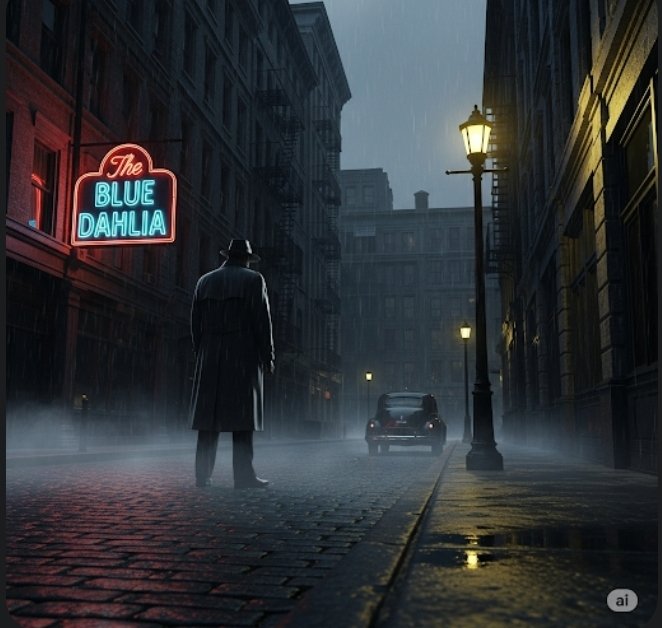
An Unreal World
The Los Angeles of "The Blonde with Black Eyes" is the worst of all the sets. Black tries so hard to recreate the atmosphere of the 1950s that he forgets to bring it to life. Everything is there: the dive bars, the classic cars, the pinstriped suits. But it's all cardboard cutouts. You don't feel the stifling heat, the smell of tobacco and liquor, and the corruption doesn't permeate the air.
It's a cheap replica, a low-budget movie set. There's no tension, no real danger. Everything is child's play on a toy stage.
The narrative, in its attempt to imitate Chandler's style, becomes ponderous and repetitive. There's a saturation of interior monologues and descriptions that contribute nothing; they only seek to emulate a tone the author can't master. It's a poor copy, a failed attempt to revive something that should have remained dead.
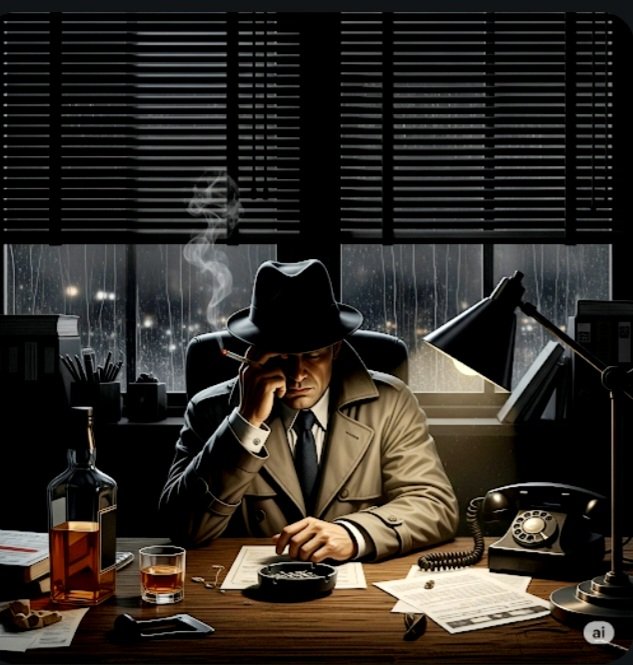
The End of Disillusionment
The climax of the novel is as bland as the rest of the book. After countless plot twists, false leads, and one-dimensional characters, the final revelation is so tepid it's almost a mockery. The pieces fit together, but they do so in such a predictable and unemotional way that you wonder why you bothered reading to the end. There's no surprise, no catharsis, only the disappointment of a reader who expected something more than a poorly done remake of a classic.
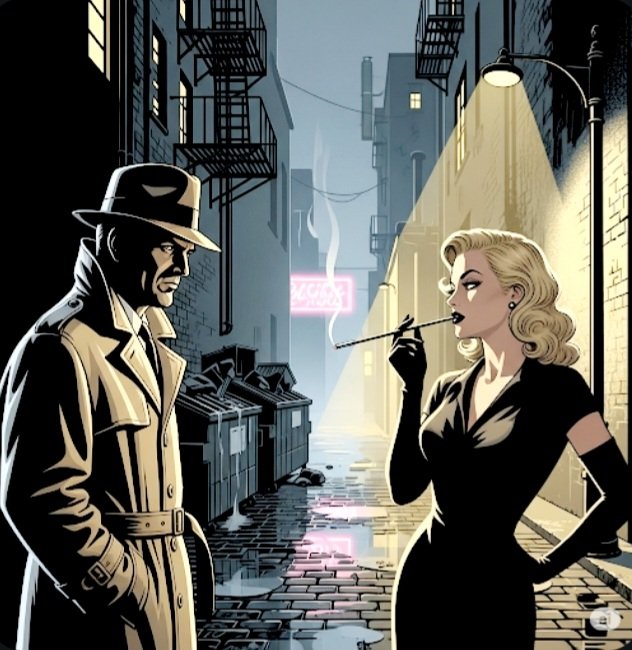
"The Blonde with Black Eyes" isn't just a bad novel, it's an act of betrayal. It betrays the memory of Raymond Chandler and betrays a character who deserved a better rest.
It's a book for those who yearn for Marlowe, but are happy to settle for a cheap replica.
In the end, one finishes the novel with a feeling of emptiness, that it would have been better to leave the great Philip Marlowe alone, resting in the Olympus of fictional detectives.
A blonde isn't always the stuff of a good novel.


"La rubia de ojos negros"

Y luego está Benjamin Black (o John Banville, que para el caso es lo mismo), que se ha empeñado en demostrar que a veces, aunque se quiere, no se puede. Su pecado: atreverse a revivir a Philip Marlowe en una novela que tituló: "La rubia de ojos negros".
Es un acto de mal gusto, una profanación literaria en toda regla.
No es que no se agradezca la intención, sino que el resultado es un insulto a la memoria de Raymond Chandler. Black se viste con el sombrero del maestro, se pone su gabardina y, en un intento torpe de imitar su andar, acaba pareciendo un payaso borracho que ha perdido el rumbo. Nos entrega no un detective, sino un fantasma caricaturizado que deambula por un Los Ángeles de inverosímil. Pecado capital en la Narrativa.

El detective de cartón
El Philip Marlowe que nos presenta Black es la versión de AliExpress del original. Sigue soltando las mismas frases cínicas y bebiendo whisky como si el mundo se acabara, pero lo hace sin el alma, sin la elegancia de la desesperanza.
El Marlowe de Chandler era un idealista golpeado por el mundo, un caballero andante en el submundo, un hombre que, a pesar de sus cicatrices, mantenía un código moral inquebrantable. El de Black es solo un cascarrabias, un saco de boxeo con una oficina mugrienta. Sus golpes y su miseria no conmueven, aburren.
Parece disfrutar del castigo físico, metiéndose en peleas inútiles con una regularidad que haría sonrojar a cualquier detective con un mínimo de inteligencia.
Este Marlowe, en lugar de ser un maestro de la deducción, es un idiota con suerte (o, más bien, un idiota sin ella). Va de un lado a otro, dando palos de ciego, se deja engañar con una facilidad pasmosa y parece incapaz de seguir un rastro sin que lo apaleen antes. Nos lo quieren vender como el mismo tipo de las novelas de Chandler, pero es un muñeco. Un espantapájaros desecho en un campo de maíz.
Cuando habla, parece que un ventrílocuo está moviendo su mandíbula. Le falta la chispa, el fuego interior que lo hacía grande. Este es una versión aguada, monótona y, francamente, irritante de un ícono.

La rubia, la gran estafa
Y luego está ella, la protagonista del título, la supuesta femme fatale que debe mover los hilos de la trama: Clare Cavendish. El título promete una mujer misteriosa, seductora, peligrosa.
¿Qué nos dan?
Una muñeca de porcelana con una personalidad tan profunda como un charco de lluvia. Clare Cavendish es un cliché andante, una fórmula literaria en tacones, de piernas falsas y un rencor vivo que le va secando el alma sin piedad. Es pobre pero aspira a ser rica, caprichosa y, por supuesto, esconde secretos que harían bostezar a un caracol. Existe en la novela no como un personaje, sino como una excusa para que Marlowe se meta en líos.
Black nos dice que es irresistible, que tiene un magnetismo sobrenatural, pero nunca lo demuestra. Los personajes hablan de ella como si fuera un mito, pero cuando aparece en escena, es una mujer vacía, sin carácter. Su misterio se deshace con la primera ráfaga de viento. Marlowe se obsesiona con ella, pero su fascinación no se siente, solo se nos dice.
Es como si el autor, en un acto de pereza narrativa, hubiera puesto una pegatina que dice "mujer fatal" en un personaje que, de otra forma, sería completamente olvidable.
El "misterio" que la rodea es tan superficial como su personalidad. Sus motivaciones son débiles, sus acciones no tienen el peso dramático necesario. Es el epítome de los fallos del libro: una idea robada de la literatura clásica, puesta en un contexto moderno sin ningún tipo de ingenio o reinterpretación.
Al final, no importa si tiene los ojos negros o azules, la rubia de esta novela es solo un fantasma en blanco y negro, una postal sin vida de un Los Ángeles que tampoco existe.

Un mundo irreal
El Los Ángeles de "La rubia de ojos negros" es el peor de todos los decorados. Black se esfuerza tanto en recrear la atmósfera de los años 50 que se olvida de darle vida. Todo está allí: los bares de mala muerte, los coches clásicos, los trajes de raya diplomática. Pero todo es de cartón piedra. No se siente el calor sofocante, el olor a tabaco y licor, la corrupción no se respira en el aire.
Es una réplica barata, un decorado de cine de bajo presupuesto. No hay tensión, no hay peligro real. Todo es un juego de niños en un escenario de juguete.
La narrativa, en su intento por imitar el estilo de Chandler, se vuelve pesada y repetitiva. Hay una saturación de monólogos interiores y descripciones que no aportan nada, solo buscan emular un tono que el autor no logra dominar. Es una copia mala, un intento fallido de hacer revivir algo que debió haber permanecido muerto.

El final de la desilusión
El clímax de la novela es tan insípido como el resto del libro. Después de un sinfín de golpes, pistas falsas y personajes unidimensionales, la revelación final es tan tibia que resulta casi una burla. Las piezas encajan, pero lo hacen de una forma tan predecible y sin emoción que uno se pregunta por qué se ha molestado en leer hasta el final. No hay sorpresa, no hay catarsis, solo la decepción de un lector que esperaba algo más que una versión mal hecha de un clásico.

"La rubia de ojos negros" no es solo una mala novela, es un acto de traición. Traiciona la memoria de Raymond Chandler y traiciona a un personaje que merecía un mejor descanso.
Es un libro para aquellos que añoran a Marlowe, pero que no tienen problemas en conformarse con una réplica de bajo coste.
Al final, uno termina la novela con una sensación de vacío, de que hubiera sido mejor dejar al gran Philip Marlowe en paz, descansando en el Olimpo de los detectives de ficción.
No siempre una rubia es material para una buena novela.


🌱 Contenido Original / Original Content
🌱 Imágenes inspiradas en la novela y generadas en Gemini AI/Images inspired by the novel and generated in Gemini AI
🌱 Traducción Google Translation/Translation Google Translation


Siempre creo en lo que expones porque sabes equilibrar la apreciación. Éxitos para ti
Gracias, estimada mía.
Viniendo de ti, gran ser humano y crítica de arte, es un lujo tenerte aquí ✨✍️
😊 me sobre estimas
Te confieso que esto me ha sucedido con unos cuantos libros, pero no he tenido el valor de escribir una reseña negativa. Me parece que a veces escribir una reseña negativa es como insuflar vida artificial a un cadáver: no se lo merece y no hay punto en ello.
Por supuesto, hay casos y casos. En ocasiones la mejor respuesta es el silencio, mientras en otras es mejor disipar el espejismo con un par de líneas bien puestas como en este caso. Gracias por esa sinceridad sin límites, poner las cosas en su lugar tiene también un valor.
@topcomment
Delegate your Hive Power to Ecency and earn
100% daily curation rewards in $Hive!
Muchos refieren que fue una novela que logró entretener, pero su principal propósito era hacerle un homenaje póstumo a Raymond Chandler y en lo personal considero que no sé logró. Como siempre tus reseñas nos llevan a un análisis más profundo.
Gracias por compartir tus criterios sobre el texto.
Congratulations @marabuzal! You have completed the following achievement on the Hive blockchain And have been rewarded with New badge(s)
Your next target is to reach 4000 upvotes.
You can view your badges on your board and compare yourself to others in the Ranking
If you no longer want to receive notifications, reply to this comment with the word
STOPCheck out our last posts:
Su post ha sido votado por Green Zone.
Te invitamos a participar en nuestra comunidad
Para más detalles aquí te explicamos